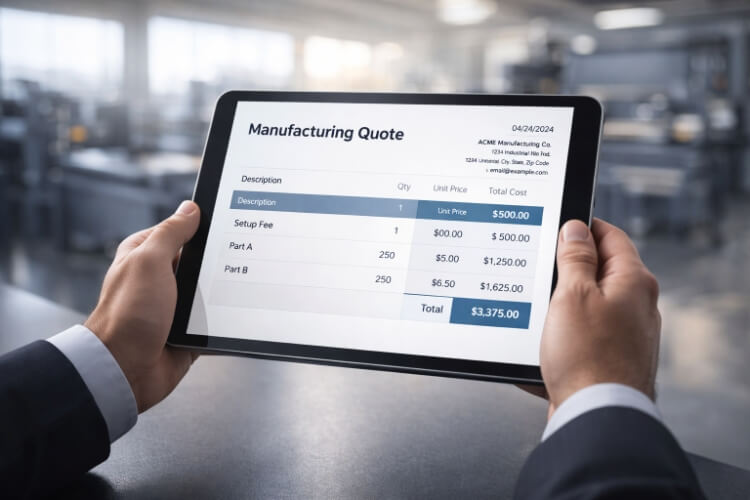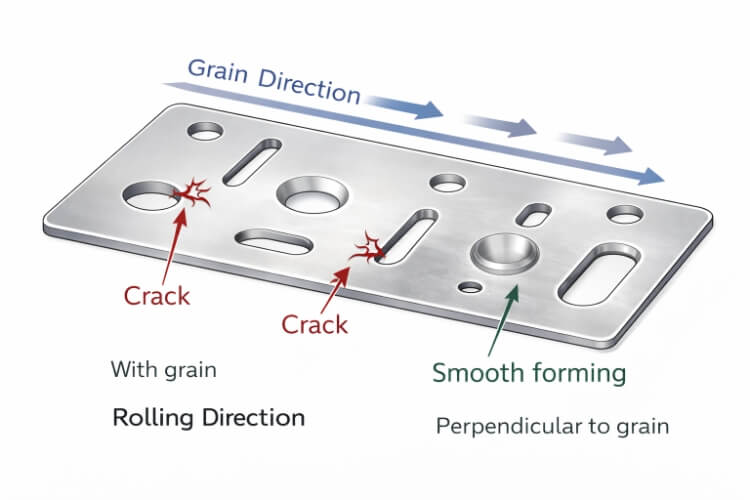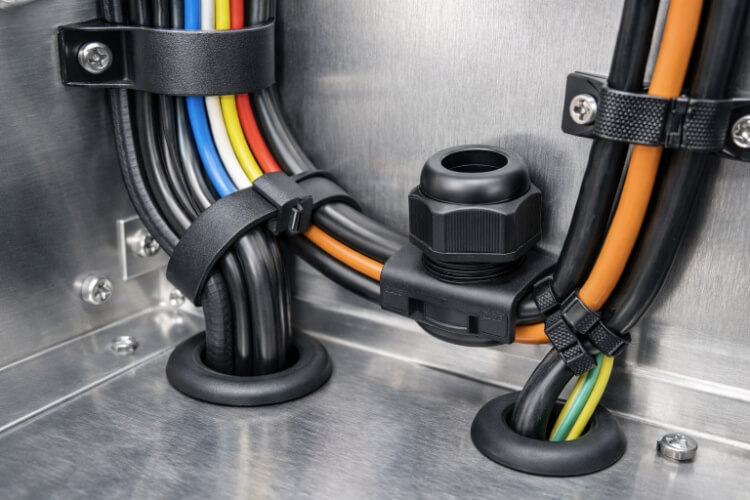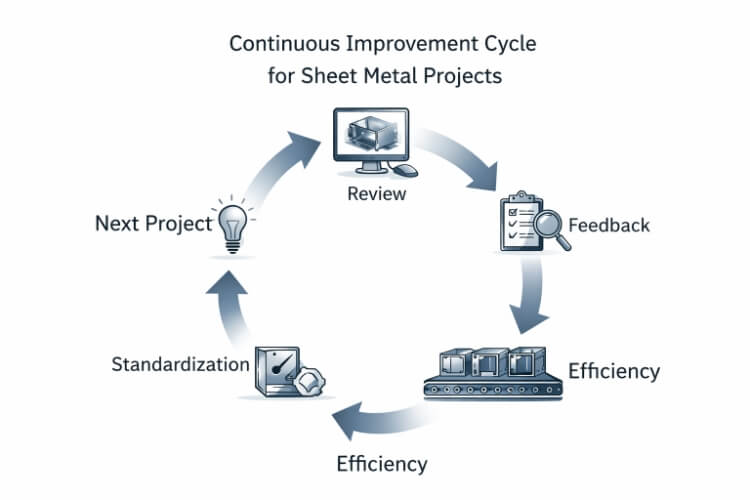When assembling metal parts, choosing the right fastener is crucial. But with so many types available, it can be overwhelming to know where to start. Are you unsure which fastener best suits your project? The wrong fastener can lead to weak connections, resulting in failures or safety risks. Choosing the right one ensures your assembly stays strong and reliable.
Fasteners come in many shapes and sizes, each serving a different purpose. To choose the correct fastener, consider material, load requirements, environmental conditions, and ease of assembly. The key is to match the fastener’s characteristics to the needs of your project.
Fasteners are a small but essential part of many products. Read on to learn more about the different types and their best uses.
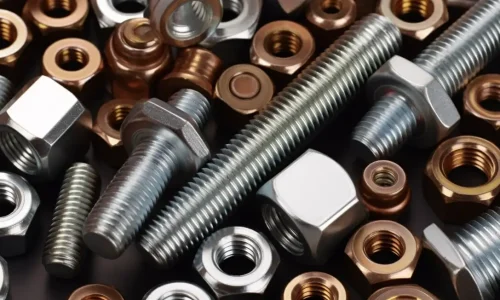
What is a fastener?
A fastener is a tool that joins objects together. Common examples include screws, washers, nuts, and bolts. These tools all serve one primary purpose: they hold two or more items together mechanically.
Fasteners work differently than glue. They can connect metal, plastic, wood, and concrete items. They are strong enough to hold objects that face heavy pressure or strain.
Fasteners come in two main types. These are permanent fasteners and non-permanent fasteners. Most fasteners create joints that can be taken apart. You should be able to separate the connected parts without breaking them. The rivet is different, though. It is a permanent fastener that cannot be easily removed.
We use fasteners every day in many settings. They offer a simple way to connect things, making it easy to put things together and take them apart when needed.
Types of Fasteners
Fasteners come in many varieties, each with specific strengths and ideal applications. Knowing the differences helps you select the best option for your project.
Screws
Screws are threaded fasteners that create their mating threads when driven into materials. Their helical ridges convert rotational force into linear movement.
Bolts
Bolts are externally threaded fasteners designed to be inserted through holes in assembled parts and mated with a nut. They typically require wrenches or other tools for installation.
Nuts
Nuts are internally threaded fasteners designed to mate with bolts or screws. They provide clamping force when tightened against a surface.
Washers
Washers are thin plates with holes that distribute the load of a threaded fastener. They prevent damage to the joined materials and provide additional functions.
Rivets
Rivets create permanent connections by deforming a shaft or pin. They work well in applications where access to both sides is available.
Nails
Nails are straight metal pins with a head and pointed tip. They’re driven into materials using impact force rather than rotation.
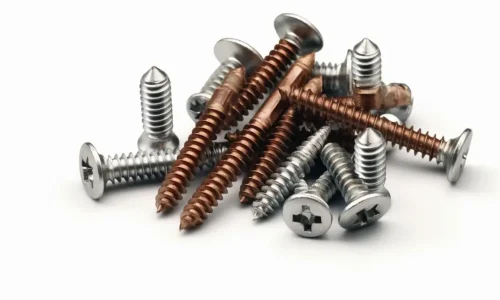
Different Types of Fasteners and Their Uses
Fasteners come in many shapes and sizes, each designed for specific tasks. Let’s explore the most common types and their uses.
Bolt Types
Hex-Head Bolts
The most common type is a hex-head bolt. They have a six-sided head and are used with a wrench or socket. These strong and reliable bolts are ideal for construction and machinery.
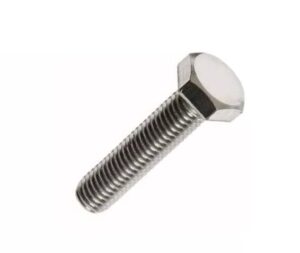
Double End Bolts
Double-end bolts have threads on both ends. They often connect two parts with a nut on each end. These bolts are standard in automotive and machinery applications.
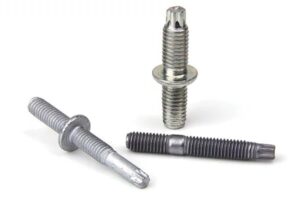
Eye Bolts
Eye bolts have a loop at one end. They are used to attach cables, ropes, or chains. These bolts are ideal for lifting or pulling applications.
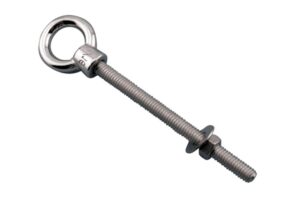
Carriage Bolts
Carriage bolts have a smooth, rounded head and a square section underneath. The square section prevents the bolt from turning, making it useful in wood applications.
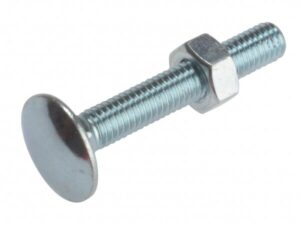
Socket Head Bolts
Socket head bolts have a cylindrical head with a hexagonal socket. They are used in tight spaces where a wrench won’t fit. These bolts are standard in machinery and automotive applications.
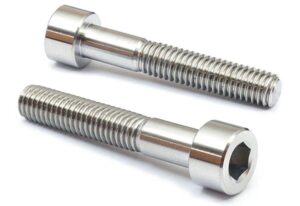
U-Bolts
U-bolts are shaped like the letter “U” and have threads on both ends. They are used to secure pipes or tubes to surfaces and are standard in plumbing and automotive applications.
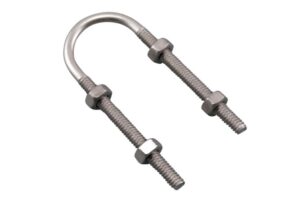
Screw Types
Self-Drilling Screws
Self-drilling screws have a drill point, so they don’t need a pilot hole. They are used in metal and wood applications, making them quick and easy to install.
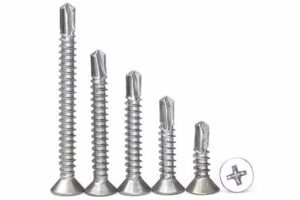
Sheet Metal Screws
Sheet metal screws have sharp threads and are used to fasten thin metal sheets. They are also used in plastic and wood applications.
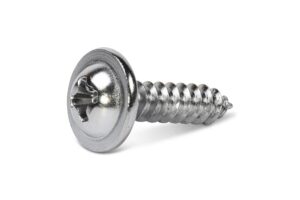
Machine Screws
Machine screws are used with nuts or tapped holes. They are common in machinery, electronics, and appliances.
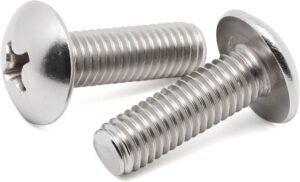
Hex Lag Screws
Hex lag screws have a hexagonal head and coarse threads. They are used in wood applications, such as deck building and framing.
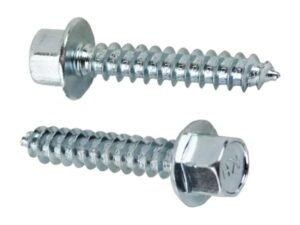
Deck Screws
Deck screws are designed for outdoor use. They have a corrosion-resistant coating and are used to build decks and outdoor structures.
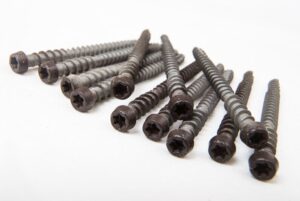
Wood Screws
Wood screws have coarse threads and are used in wood applications. They provide a firm hold and are easy to install.
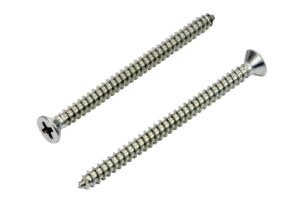
Nut Types
Cap Nuts
Cap nuts have a domed top that covers the end of the bolt. They are used for safety and appearance and are common in furniture and machinery.
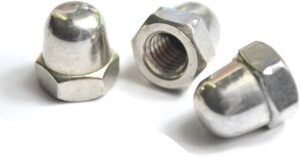
Castle Nuts
Castle nuts have slots on one end for a cotter pin. They are used in high-vibration applications, such as automotive and machinery.
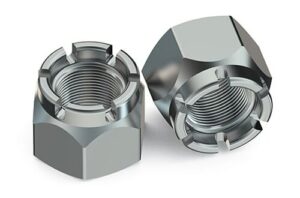
Weld Nuts
Weld nuts are welded to a surface, providing a threaded hole. They are used in metal fabrication and machinery.
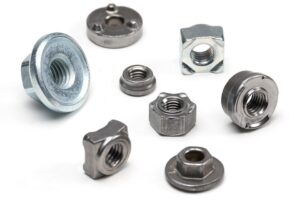
Hex Nuts
The most common type is hex nuts. They have six sides and are used with bolts to secure materials.
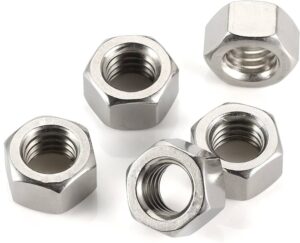
Washer Types
Plain Washers
Plain washers distribute the load and prevent damage to surfaces. They are used in general applications.
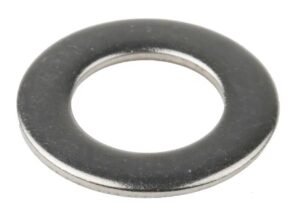
Spring Washers
Spring washers provide tension and prevent loosening. They are used in high-vibration environments.
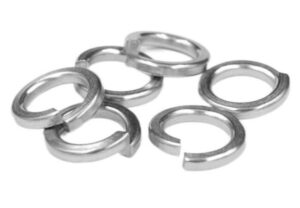
Locking Washers
Locking washers have teeth or ridges that grip the surface. They prevent bolts and nuts from loosening over time.
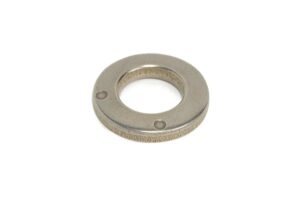
Dock Washers
Dock washers are large and thick and used in heavy-duty applications like dock building. They distribute the load over a larger area.
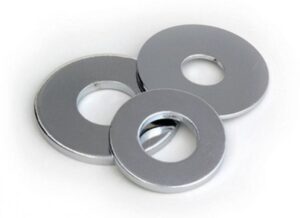
Rivet Types
POP Rivets
POP rivets are easy to install and provide a stronghold. They are used in lightweight materials like metal and plastic.
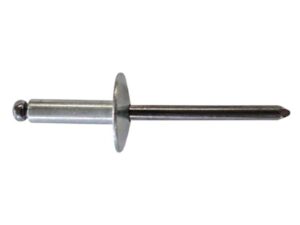
Multi-Grip Rivets
Multi-grip rivets can join materials of varying thicknesses. They are used in automotive and machinery applications.
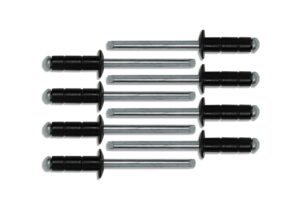
Tri-Fold Rivets
Tri-fold rivets have three legs that fold out, providing a stronghold. They are used in heavy-duty applications.
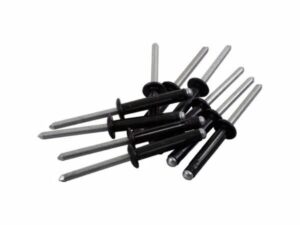
Large Flange Rivets
Large flange rivets have a wider head, distributing the load over a larger area. They are used in soft or fragile materials.
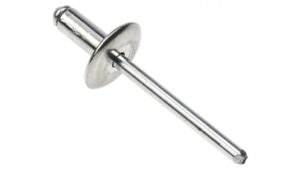
Factors to Consider When Choosing the Right Fastener
This part of the selection process can make or break your project. The right factors lead to lasting connections.
Material Compatibility
Material selection affects both the performance and longevity of fastened joints. Matching materials properly prevents premature failure.
Steel Fasteners vs. Stainless Steel
Steel fasteners offer high strength at lower costs. They work well in many indoor applications.
- Carbon steel: Provides excellent strength but requires protective coatings
- Alloy steel: Contains additional elements for enhanced properties
- Case-hardened steel: Features a hardened surface with a rigid core
Stainless steel fasteners resist corrosion without coatings. They’re ideal for wet or harsh environments.
- 304 stainless: Good all-purpose corrosion resistance
- 316 stainless: Superior resistance to chlorides and salt environments
- 410 stainless: Magnetic with moderate corrosion resistance, can be heat treated
Aluminum vs. Brass Fasteners
Aluminum fasteners are lightweight and resist certain types of corrosion. They work best in non-structural applications.
- Benefits: Low weight, good corrosion resistance, non-magnetic
- Limitations: Lower strength, not suitable for high-load applications
Brass fasteners offer excellent corrosion resistance and are non-sparking. They’re often used in marine and gas applications.
- Benefits: Excellent corrosion resistance, good electrical conductivity, aesthetically pleasing
- Limitations: Lower strength than steel, higher cost, may experience stress corrosion in specific environments
Size and Thread Type
Proper sizing ensures adequate strength without excess material or oversized holes.
Choosing the Right Diameter
The diameter of the fastener affects its strength and fit. A larger diameter provides more strength but requires a bigger hole. Always match the fastener diameter to the load and material thickness.
- Too small: May fail under load or pull through the material
- Too large: Creates unnecessary stress concentrations and wastes material
- Rule of thumb: Fastener diameter should be 1/4 to 1/3 of the thinnest material being joined
Understanding Thread Pitch and Length
Thread pitch refers to the distance between threads. Thread pitch affects both strength and installation characteristics.
- Coarse threads: Faster installation, better in soft materials, more tolerance for damage
- Fine threads: Higher tensile strength, better vibration resistance, more precise adjustment
Thread length must provide sufficient engagement without protruding unnecessarily.
- Minimum engagement: 1x diameter for aluminum, 1.5x for steel, 2x for plastic
- Maximum length: Avoid unnecessary protrusion that might interfere with other components
Strength and Load Capacity
Load analysis is critical for proper fastener selection. Different loads require different fastener properties.
Tensile Strength of Different Fasteners
Tensile strength measures a fastener’s resistance to being pulled apart.
- Grade 8.8 metric bolts: 800 MPa yield strength
- Grade 5 SAE bolts: 85,000 PSI tensile strength
- Stainless steel (A2-70): 700 MPa tensile strength
When selecting tensile loads:
- Calculate the maximum expected load
- Apply safety factor (typically 1.5-3x)
- Choose a fastener with adequate rated capacity
Shear Strength Considerations
Shear loads try to cut the fastener across its diameter. Most fasteners have lower shear than tensile strength.
- Most steel fasteners: Shear strength ≈ 60% of tensile strength
- Aluminum fasteners: Even lower shear-to-tensile ratio
For shear applications:
- Use multiple fasteners when possible
- Choose fasteners with whole shanks (unthreaded portion) through the shear plane
- Consider dowel pins for pure shear loads
Environmental Resistance
Environmental factors can drastically reduce fastener life. Match your fastener to your operating conditions.
Corrosion Resistance in Outdoor and Marine Applications
Outdoor exposure demands corrosion protection strategies.
- Galvanized steel: Good for general outdoor use
- Hot-dip galvanized: Superior for severe exposure
- 316 stainless steel: Excellent for marine environments
- Silicon bronze: Premium choice for constant saltwater exposure
Avoid galvanic corrosion by:
- Using fasteners that are the same material as or nobler than the joined materials
- Using insulating washers between dissimilar metals
- Applying protective coatings at connection points
Fasteners for High-Temperature Conditions
Standard fasteners can weaken or fail at elevated temperatures.
- Grade 8.8 steel: Good to about 400°F (204°C)
- A286 stainless: Maintains strength to 1000°F (538°C)
- Inconel: Excellent for temperatures up to 1800°F (982°C)
When selecting for high-temperature use:
- Check temperature-adjusted strength ratings
- Allow for thermal expansion
- Consider stress relaxation over time
Fasteners for Extreme Pressure or Vibration
Vibration can loosen fasteners over time. High pressure can cause fastener distortion.
Vibration-resistant options:
- Nylon insert lock nuts
- Thread-locking compounds (Loctite)
- Serrated flange fasteners
- Nord-Lock washers
High-pressure solutions:
- Higher grade fasteners
- Larger diameter fasteners
- Multiple fastener patterns
- Specialized pressure-sealed designs
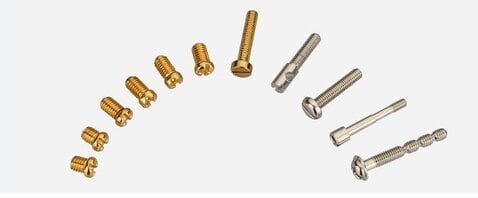
Application-Specific Fastener Selection
Different materials and applications require specific fasteners for a strong and durable connection. Professional fastener suppliers can help you explore the best fasteners for various uses.
Automotive Applications
Automotive fasteners must withstand vibration, temperature changes, and exposure to fluids.
Automotive Fastener Features:
- Vibration resistance (lock washers, thread-locking compounds)
- Corrosion protection for harsh environments
- Standardized sizes for maintenance ease
Electronics Assembly
Electronics require fasteners that are often smaller and lighter, with specific electrical properties.
Electronics Fastener Needs:
- Non-conductive options for specific applications
- Small sizes for compact designs
- Low profile heads to save space
- Anti-vibration features
Construction Projects
Construction fasteners must provide long-term structural integrity under various loads and environmental conditions.
Construction Fastener Requirements:
- High load capacity
- Weather resistance
- Code Compliance
- Fire resistance ratings in some cases
Conclusion
Choosing the right fastener requires balancing several factors. Take the time to analyze your specific application needs rather than simply selecting familiar options. Understanding the different types of fasteners and their optimal applications can help you make more informed decisions.
Are you struggling to find the perfect fastener for your project? Let us help! Our team of experts is here to guide you through the selection process, ensuring you get the best solution for your needs. Contact us today for a free consultation or to request a quote. We’re ready to answer your questions and provide fast, reliable service.
Hey, I'm Kevin Lee

For the past 10 years, I’ve been immersed in various forms of sheet metal fabrication, sharing cool insights here from my experiences across diverse workshops.
Get in touch

Kevin Lee
I have over ten years of professional experience in sheet metal fabrication, specializing in laser cutting, bending, welding, and surface treatment techniques. As the Technical Director at Shengen, I am committed to solving complex manufacturing challenges and driving innovation and quality in each project.

